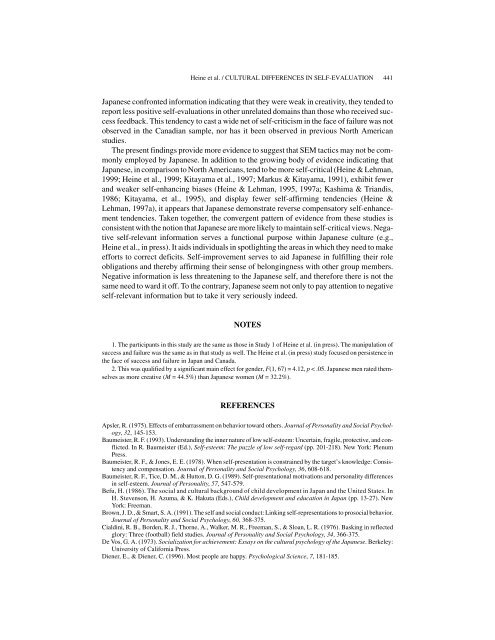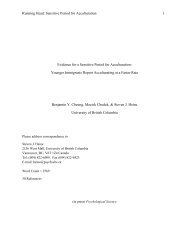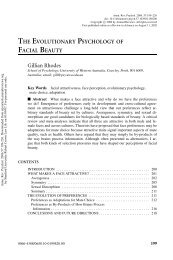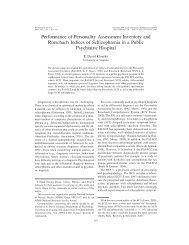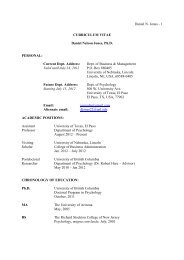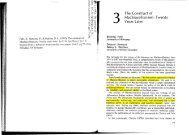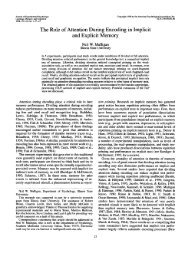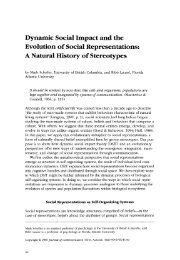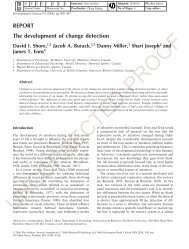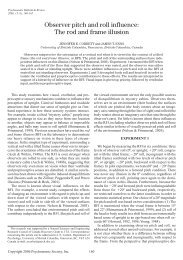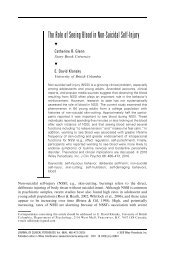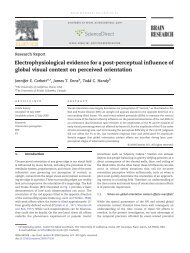Heine et al. / <strong>CULTURAL</strong> <strong>DIFFERENCES</strong> <strong>IN</strong> <strong>SELF</strong>-<strong>EVALUATION</strong> 441<strong>Japanese</strong> confronted information indicating that they were weak in creativity, they tended toreport less positive self-evaluations in other unrelated domains than those who received successfeedback. This tendency to cast a wide net of self-criticism in the face of failure was notobserved in the Canadian sample, nor has it been observed in previous North Americanstudies.The present findings provide more evidence to suggest that SEM tactics may not be commonlyemployed by <strong>Japanese</strong>. In addition to the growing body of evidence indicating that<strong>Japanese</strong>, in comparison to North Americans, tend to be more self-critical (Heine & Lehman,1999; Heine et al., 1999; Kitayama et al., 1997; Markus & Kitayama, 1991), exhibit fewerand weaker self-enhancing biases (Heine & Lehman, 1995, 1997a; Kashima & Triandis,1986; Kitayama, et al., 1995), and display fewer self-affirming tendencies (Heine &Lehman, 1997a), it appears that <strong>Japanese</strong> demonstrate reverse compensatory self-enhancementtendencies. Taken together, the convergent pattern of evidence from these studies isconsistent with the notion that <strong>Japanese</strong> are more likely to maintain self-critical views. Negativeself-relevant information serves a functional purpose within <strong>Japanese</strong> culture (e.g.,Heine et al., in press). It aids individuals in spotlighting the areas in which they need to makeefforts to correct deficits. Self-improvement serves to aid <strong>Japanese</strong> in fulfilling their roleobligations and thereby affirming their sense of belongingness with other group members.Negative information is less threatening to the <strong>Japanese</strong> self, and therefore there is not thesame need to ward it off. To the contrary, <strong>Japanese</strong> seem not only to pay attention to negativeself-relevant information but to take it very seriously indeed.NOTES1. The participants in this study are the same as those in Study 1 of Heine et al. (in press). The manipulation ofsuccess and failure was the same as in that study as well. The Heine et al. (in press) study focused on persistence inthe face of success and failure in Japan and Canada.2. This was qualified by a significant main effect for gender, F(1, 67) = 4.12, p < .05. <strong>Japanese</strong> men rated themselvesas more creative (M = 44.5%) than <strong>Japanese</strong> women (M = 32.2%).REFERENCESApsler, R. (1975). Effects of embarrassment on behavior toward others. Journal of Personality and Social Psychology,32, 145-153.Baumeister, R. F. (1993). Understanding the inner nature of low self-esteem: Uncertain, fragile, protective, and conflicted.In R. Baumeister (Ed.), Self-esteem: The puzzle of low self-regard (pp. 201-218). New York: PlenumPress.Baumeister, R. F., & Jones, E. E. (1978). When self-presentation is constrained by the target’s knowledge: Consistencyand compensation. Journal of Personality and Social Psychology, 36, 608-618.Baumeister, R. F., Tice, D. M., & Hutton, D. G. (1989). Self-presentational motivations and personality differencesin self-esteem. Journal of Personality, 57, 547-579.Befu, H. (1986). The social and cultural background of child development in Japan and the United States. InH. Stevenson, H. Azuma, & K. Hakuta (Eds.), Child development and education in Japan (pp. 13-27). NewYork: Freeman.Brown, J. D., & Smart, S. A. (1991). The self and social conduct: Linking self-representations to prosocial behavior.Journal of Personality and Social Psychology, 60, 368-375.Cialdini, R. B., Borden, R. J., Thorne, A., Walker, M. R., Freeman, S., & Sloan, L. R. (1976). Basking in reflectedglory: Three (football) field studies. Journal of Personality and Social Psychology, 34, 366-375.De Vos, G. A. (1973). Socialization for achievement: Essays on the cultural psychology of the <strong>Japanese</strong>. Berkeley:University of California Press.Diener, E., & Diener, C. (1996). Most people are happy. Psychological Science, 7, 181-185.
442 JOURNAL OF CROSS-<strong>CULTURAL</strong> PSYCHOLOGYDoi, T. (1973). The anatomy of dependence. Tokyo: Kodansha.Greenberg, J., & Pyszczynski, T. (1985). Compensatory self-inflation: A response to the threat to self-regard of publicfailure. Journal of Personality and Social Psychology, 49, 273-280.Greenwald, A. G. (1980). The totalitarian ego: Fabrication and revision of personal history. American Psychologist,35, 603-618.Heine, S. J., Kitayama, S., Lehman, D. R., Takata, T., Ide, E., Leung, C., & Matsumoto, H. (in press). Divergentmotivational consequences of success and failure in Japan and North America. Journal of Personality andSocial Psychology.Heine, S. J., & Lehman, D. R. (1995). Cultural variation in unrealistic optimism: Does the West feel more invulnerablethan the East? Journal of Personality and Social Psychology, 68, 595-607.Heine, S. J., & Lehman, D. R. (1997a). The cultural construction of self-enhancement: An examination ofgroup-serving biases. Journal of Personality and Social Psychology, 72, 1268-1283.Heine, S. J., & Lehman, D. R. (1997a). Culture, dissonance, and self-affirmation. Personality and Social PsychologyBulletin, 23, 389-400.Heine, S. J., & Lehman, D. R. (1999). Culture, self-discrepancies, and self-satisfaction. Personality and Social PsychologyBulletin, 25, 915-925.Heine, S. J., Lehman, D. R., Markus, H. R., & Kitayama, S. (1999). Is there a universal need for positive self-regard?Psychological Review, 106, 766-794.Heine, S. J., Takata, T., & Lehman, D. R. (2000). Beyond self-presentation: Evidence for self-criticism among <strong>Japanese</strong>.Personality and Social Psychology Bulletin, 26, 71-78.Kashima, Y., & Triandis, H. C. (1986). The self-serving bias in attributions as a coping strategy: A cross-culturalstudy. Journal of Cross-Cultural Psychology, 17, 83-97.Kitayama, S., & Markus, H. R. (in press). The pursuit of happiness and the realization of sympathy: Cultural patternsof self, social relations, and well-being. In E. Diener & E. Suh (Eds.), Subjective well-being across cultures.Cambridge, MA: MIT Press.Kitayama, S., Markus, H. R., Matsumoto, H., & Norasakkunkit, V. (1997). Individual and collective processes in theconstruction of the self: Self-enhancement in the United States and self-criticism in Japan. Journal of Personalityand Social Psychology, 72, 1245-1267.Kitayama, S., Takagi, H., & Matsumoto, H. (1995). Causal attribution of success and failure: Cultural psychology ofthe <strong>Japanese</strong> self [in <strong>Japanese</strong>]. <strong>Japanese</strong> Psychological Review, 38, 247-280.Leary, M. R., Tambor, E. S., Terdal, S. K., & Downs, D. L. (1995). Self-esteem as an interpersonal monitor: Thesociometer hypothesis. Journal of Personality and Social Psychology, 68, 518-530.Markus, H. R., & Kitayama, S. (1991). Culture and the self: Implications for cognition, emotion, and motivation.Psychological Review, 98, 224-253.Mednick, S. A. (1962). The associative basis of the creative process. Psychological Review, 26, 220-232.Meijer, Z. Y., & Semin, G. R. (1999). When the self-serving bias does not serve the self: Attributions of success andfailure in cultural perspective. Manuscript submitted for publication.Peng, K., Nisbett, R. E., & Wong, N.Y.C. (1997). Validity problems comparing values across cultures and possiblesolutions. Psychological Methods, 2, 329-344.Pleban, R., & Tesser, A. (1981). The effects of relevance and quality of another’s performance on interpersonalcloseness. Social Psychology Quarterly, 44, 278-285.Rosenberg, M. (1965). Society and the adolescent self-image. Princeton, NJ: Princeton University Press.Schneider, D. J. (1969). Tactical self-presentation after success and failure. Journal of Personality and Social Psychology,13, 262-268.Solomon, S., Greenberg, J., & Pyszczynski, T. (1991). A terror management theory of social behavior: The psychologicalfunctions of self-esteem and cultural worldviews. In L. Berkowitz (Ed.), Advances in experimentalsocial psychology (Vol. 24, pp. 93-159). San Diego, CA: Academic Press.Steele, C. M. (1988). The psychology of self-affirmation: Sustaining the integrity of the self. In L. Berkowitz (Ed.),Advances in experimental social psychology (Vol. 21, pp. 261-302). San Diego, CA: Academic Press.Steele, C. M., & Liu, T. J. (1983). Dissonance processes as self-affirmation. Journal of Personality and Social Psychology,45, 5-19.Steele, C. M., Spencer, S. J., & Lynch, M. (1993). Self-image resilience and dissonance: The role of affirmationalresources. Journal of Personality and Social Psychology, 64, 885-896.Taylor, S. E., & Brown, J. D. (1988). Illusion and well-being: A social psychological perspective on mental health.Psychological Bulletin, 103,193-210.Tesser, A. (1988). Toward a self-evaluation maintenance model of social behavior. In L. Berkowitz (Ed.), Advancesin experimental social psychology (Vol. 21, pp. 181-227). San Diego, CA: Academic Press.Tesser, A., Campbell, J. D., & Smith, M. (1984). Friendship choice and performance: Self-evaluation maintenancein children. Journal of Personality and Social Psychology, 46, 561-574.Tesser, A., & Paulhus, D. (1983). The definition of self: Private and public self-evaluation management strategies.Journal of Personality and Social Psychology, 44, 672-682.Tesser, A., & Smith, J. (1980). Some effects of friendship and task relevance on helping: You don’t always help theone you like. Journal of Experimental Social Psychology, 16, 582-590.


